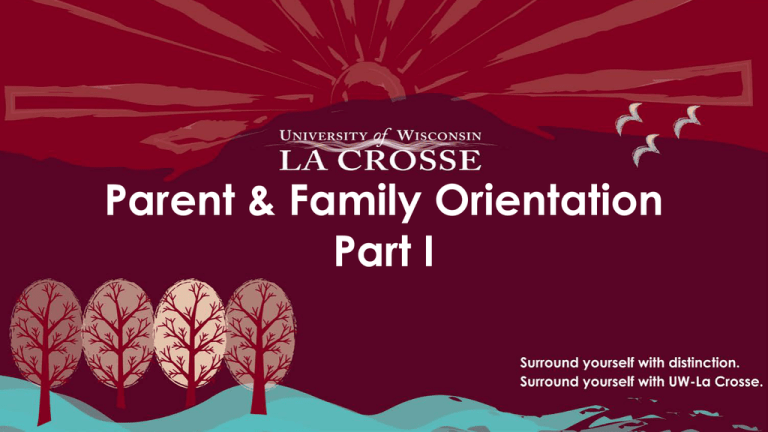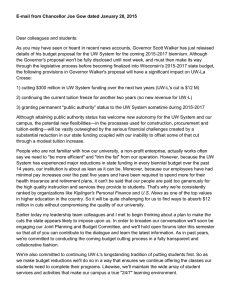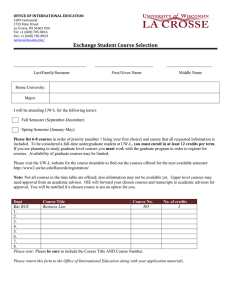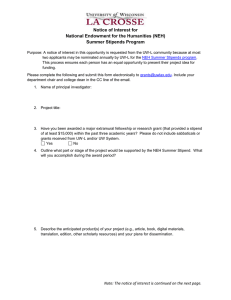
Parent & Family Orientation
Part I
Jennie Hartzheim
First-Year Experience Coordinator
Dr. Paula Knudson
Vice Chancellor for Student Affairs & Dean of Students
Parent Philosophy
UW-L acknowledges the role and importance of parents and
guardians in the success of our students. We are committed to
recognizing and responding to the concerns and suggestions of
parents or guardians by:
• Sharing student information with parents and guardians to the
extent permitted by UW-L policy, Federal and State law
• Communicating opportunities about student learning &
development, university processes, and resources
• Listening and hearing various perspectives from parents and
guardians
Student Life
Angie Lee
CARE Coordinator
Campus Assessment Response and Evaluation
Additional information can be found on pages 32-33 of the Resource Guide
Student Life
Connections
When in doubt go to…
Student Life
When you have questions…
We have answers…
and if we don’t we will help you find them.
Student Life
Advocacy
• Connect students with resources and services
• Facilitate communication with faculty when needed and
appropriate
• Liaison for extended absences
Student Life
Special Circumstances
• University Withdraw
• 100% Tuition Refund (2 weeks)
• 50% Tuition Refund (4 weeks)
• Academic Penalty if taken after half way point in semester
(approx. 8 weeks)
• Medical Withdraw
• Throughout the semester without academic penalty
Student Life
Conduct
• Academic
• Non-Academic
• Free Legal Consultation
Student Life
Behavioral Intervention
• CARE Team
• Team Approach
• Assess individuals who may pose a threat to themselves
and/or the campus community
• Collaborate, Communicate and Respond as needed
• Assist and respond to student and campus emergencies
Detective Schuster
University Police
University Police
• Services Offered
• Personal Safety
• Safety of Personal Property
Additional information can be found on page 27 of your Resource Guide
Ingrid Peterson, M.A., CSW
Violence Prevention
Specialist
UW-L Student Life
Violence Prevention
• Advocacy and Support for Interpersonal Violence
• Training and Prevention Education
• Available to all UW-L Students, Faculty, and Staff
• Free and Confidential
149 Graff Main Hall 6087855126
ipeterson@uwlax.edu
www.uwlax.edu/violenceprevention
Public Scrutiny
•
“How Many Colleges Mishandle Sexual Assault Cases — and What to
Do About It” ~ Washington Post
•
“Senate Unveils Bill to Crack Down On Colleges Botching Sexual Assault
Cases” ~ Huffington Post
•
“Senate Bill Asks Colleges to Do More to Combat Sexual Assault” ~
Chronicle of Higher Education
•
“Sexual Assault Complaint Sparks Federal Investigation into UWMadison” ~ Channel3000.com
SEXUAL ASSAULT ON CAMPUS
Sexual Assault on Campus
•
1 in 4 College Women in the U.S. experience sexual assault
during their college career
•
Reported Student Sexual Assaults at UW-L (2014): 24
UW-L Confidential Report Form Online at: www.uwlax.edu/violenceprevention
Sexual Assault on Campus
Within the last 12 months, UW-L students reported experiencing:
(American College Health Association, National College Health Assessment II, Spring 2014)
Percent (%)
Sexual touching without
consent
Sexual penetration
attempt without consent
Sexual penetration
without consent
Stalking
An emotionally abusive
intimate relationship
A physically abusive
intimate relationship
A sexually abusive
intimate relationship
Male
Female
Total
7.1
10.6
9.6
0.0
2.9
2.0
0.0
2.9
2.0
6.6
1.4
5.6
7.1
9.4
8.6
1.4
1.1
1.2
1.4
2.0
1.8
University Obligations
• Train faculty, staff, and students how to recognize and report sexual misconduct
• Promptly investigate and resolve complaints
• Take reasonable steps to prevent sexual misconduct
• Support the recovery of victims and survivors
• The law requires our institution to respond to sexual misconduct that:
• takes place on campus;
• is connected to the institution's programs; or
• is perpetrated by anyone affiliated with our institution
I am UW-L Student Session
Kate Noelke, MPH, CHES
Wellness Resource Center
Wellness Coordinator
Health Promotion & Comprehensive
Wellness
BeWell@UW-L
Multi-agency/office approach to:
• Primary prevention of injury,
communicable, chronic illness
• Awareness
• Health Education
• Health Promotion
*Building a culture of health at
UW-La Crosse.*
What we know about college drinking
• Remains a national health and safety problem (NIAAA)
• 4 out of 5 college students drink
• About half of college students who drink engage in binge drinking
• Actual and perceived use (NCHA II Survey, 2014)
• Alcohol- 78% reported actual use vs. 98% perceived use
• Marijuana- 16% reported actual use vs. 85% perceived use
• Parent-based interventions work! (Journal of Studies on Alcohol and
Drugs, 2009)
• #1 resources for our students are their parents/families.
• We are in this together
Alcohol and Other Drugs (AODA)
Prevention and Education
What we do about college drinking
• Focus on SAFETY, RESPONSIBILITY, and VALUE-BASED DECISION MAKING
• Community-wide, multi-agency interventions:
• Operation River Watch
• Safe Ride
• La Crosse Collegiate Recovery Program
Programs to promote awareness, prevention, and education @ UW-L
•
•
•
•
•
•
National Alcohol Screening Day (Counseling & Testing)
Alternative Spring Break and Safe Spring Break
Brief Alcohol Screening Intervention for College Students/CASICS
Awareness Through Performance
Universal Prevention: “Think About It” program for ALL new students
Alcohol Alternative/Substance Free events/activities Thurs/Fri/Sat
from 10pm-2am throughout the year
Faith Wagner
Student Health Center
Student Health Center
• NO Insurance is required to use the health center
• Cost of using the health service is covered by student fees
included in tuition.
• Full outpatient services
• Full Physical Therapy services
• Health center does not bill insurance; we will provide billing
information for patients to submit to their insurance for
reimbursement.
• Dispensary for common antibiotics and medicines
• Additional charge for labs, braces and long term PT treatment
Immunizations
• Yes, there is a new Meningococcal B
Vaccine. Meningitis is quite rare but life
threatening. The Meningococcal B
Vaccine is available through your primary
care provider or the student health
center. Your student may need a booster
of the regular Meningitis Vaccine before
starting college.
Immunizations
• Influenza, Recommended that every student receive an
annual Flu vaccine. A flu clinic will be offer to all students in
The first or second week of November Cost is $15 for shot, $20
for the FluMist. Personal hygiene is still a strong defense against
influenza
• Hepatitis B, Required by many professional programs. Series of
three injections available at the Student Health Center
• Tetanus, New DTaP which helps prevent Whooping Cough
(Pertussis)
Health Insurance
• No insurance is needed, but having
the family’s insurance card is strongly
recommended
• Be sure to check with your customer
service representative on coverage
issues (i.e. MRI)
Dr. Gretchen Reinders
Counseling & Testing Center
Director
A Few Points We’ll Cover
• The wisdom of Dr. Seuss:
Parents and Students in
Transition
• Introduction to Counseling &
Testing Center Services
Parents & Students in Transition
• This is an exciting and difficult time ahead of you
• Each of you may experience bringing your child to
college differently
• A time of transition for everyone
• A time of stress, but which kind of stress?
Lets take a look….
Your Challenge:
Balancing Your Roles
•
Providing guidance, structure, and care has
been your job from the beginning…
•
More recently you have been balancing that
with fostering independence.
•
This can be a struggle - You will need to protect
less, but may worry more
•
To reach independence they need freedom,
but with that comes responsibility
•
College students are just BEGINNERS in this
process
College Student Challenges
Three Basic Questions
Who am I?
Who will I be with?
What am I going to
do?
Expectations for College
• First year students are faced with so many new people,
ideas, experiences, and dilemmas – asked to assume
greater responsibility for all aspects of their lives
• Problems and struggles are inevitable
• Their challenge…
• Your challenge…
One Parenting Style…
Adult children do it too!
Consider the following…
•
•
•
•
•
Finances
Making appointments
Doing laundry
Academic planning
And remember the wisdom of the doctor
– they have brains in their head and feet
in their shoes!
Counseling & Testing Services
• No Insurance required; most services covered by student fees
included in tuition
• Confidential
• Short term services
– Referral to community providers for some specialized, more
intensive and/or longer-term treatment
• Wide continuum of services
– Collaboration with Student Health Services and many other
offices on campus
• Our clinical staff includes licensed psychologists, licensed
professional counselors, post doctoral psychology residents,
masters level practicum students, and contractual therapists
• Academic Skills
• Testing Services
Service Utilization 2014-2015
• 634 Triage Appointments (scheduled within 1-5 days of contact)
• 2005 Individual Therapy Appointments
• 167 Urgent Care Appointments
• 22 Therapy and Skills Groups
• 276 Academic Skills Appointments
• 92 Outreaches to over 2000 students
• 935 Relaxation Room visits
Learning Outcomes & Satisfaction Survey Data (Fall 2014)
• 86% of counseling clients agreed or strongly agreed that they made
improvement on treatment issues. Majority of clients said that counseling
has helped them stay at school.
• 25% of students who responded to the survey reported having strongly
considered leaving school prior to counseling - 79% of these clients
reported that counseling helped them stay in school.
Common Presenting Issues
• Most commonly reported
presenting concern was
stress/stress management
• “Common colds of mental
health”
• Anxiety
• Depression
• Adjustment & Transition
• Homesickness, Loneliness, Time
management, Relationship
difficulties
• Sleep
• Alcohol and Drug Issues
• Disordered Eating
Tips for Parents
•
•
•
•
•
•
•
Recognize that coming to college is a transition for the
whole family
Normalize transition issues. Remind your child to rely on
those coping skills that have served them well in the past
Trust and encourage independence and responsibility –
empower students
Trust in the values and ethics you have instilled in your
child
Know that UW-L is a student centered institution and wants
your student to be happy and successful
Encourage communication and stay connected
Look for red flags
How will I know if my adult child could
benefit from counseling?
•
•
•
•
•
•
•
•
•
Changes in sleep and/or eating patterns
More short-tempered than usual
Recurring colds and minor illness
Frequent muscle aches, headaches, stomachaches
Increased generalized frustration and anger
Prolonged sense of sadness
Feeling overwhelmed and helpless
Engaging in actions harmful to themselves or others
They just need someone with whom to talk
You have issues? We have tissues
Where to find us:
2106 Centennial Hall
Talking Points?



